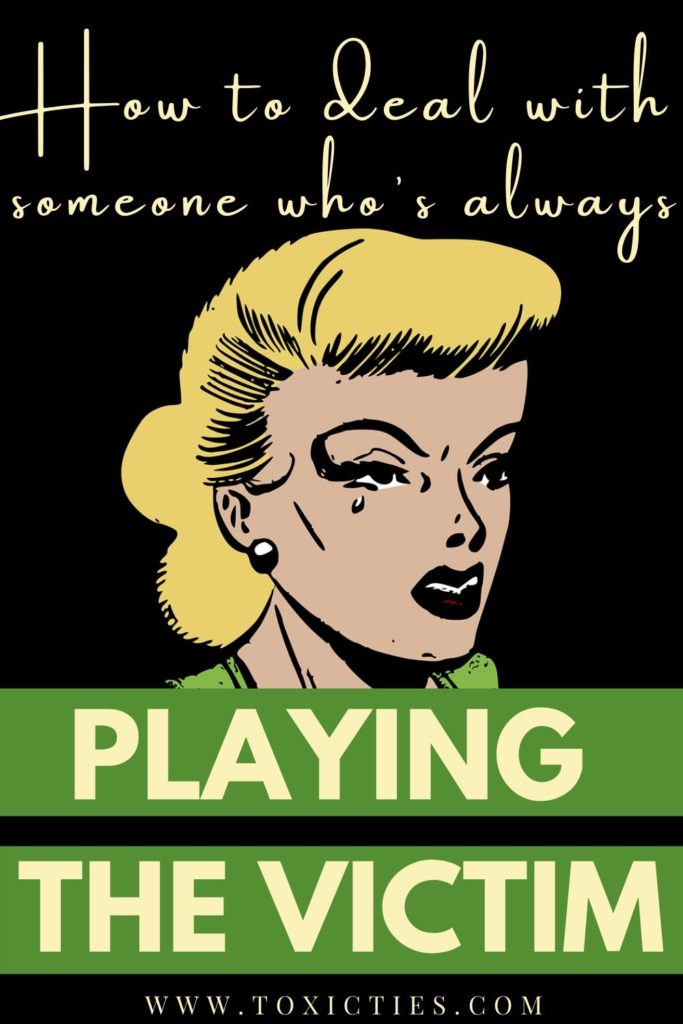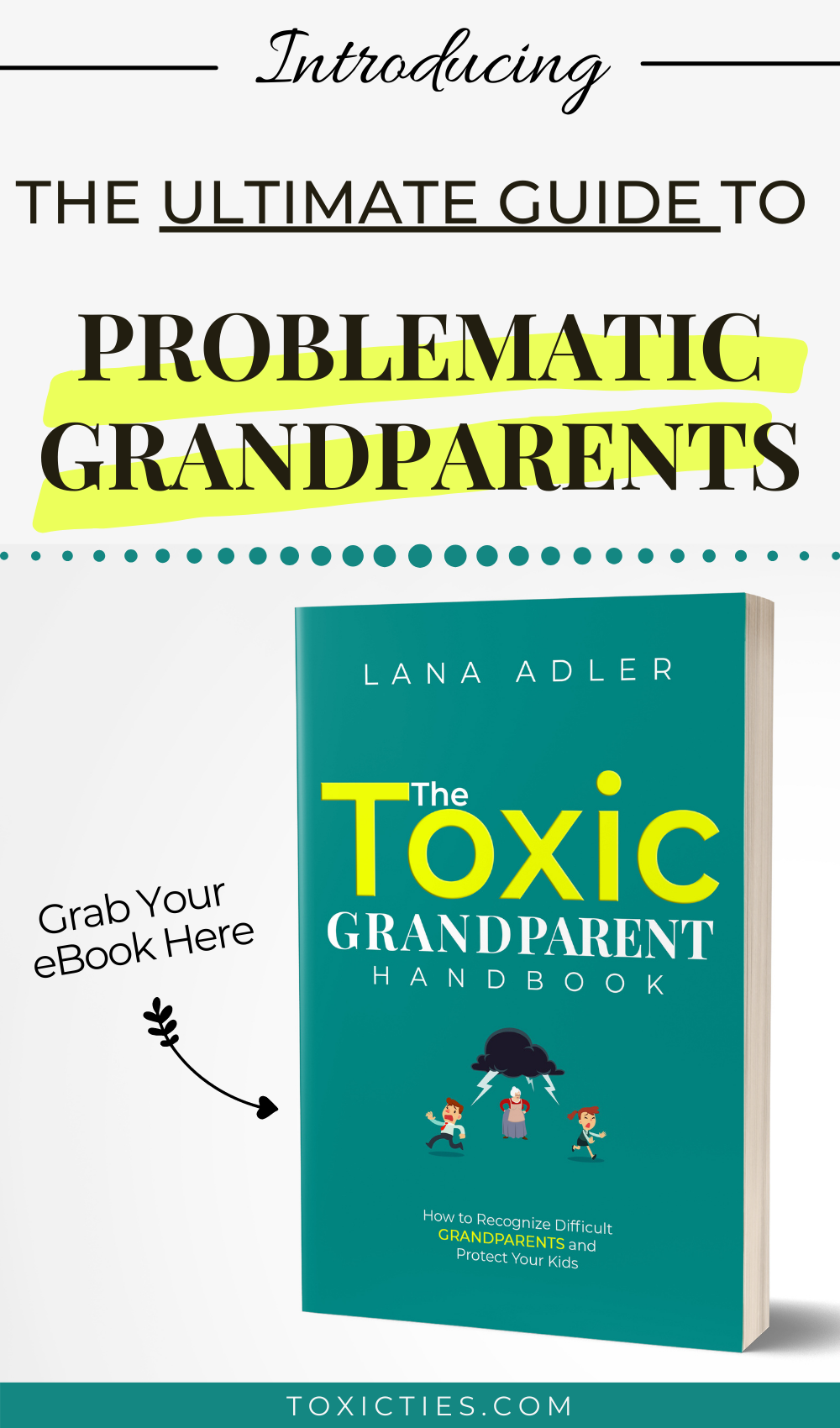Do you know someone who’s always playing the victim? Someone who never takes responsibility for their actions?
Then you know how exhausting it can be to listen to their endless tales of woe and feel a mixture of pity and frustration.
Bad things just constantly happen to them, don’t they? And no matter how hard you try to help, the person playing the victim refuses to do or change anything. It’s as if they are determined to remain in a state of victimhood.
So how do you deal with someone like that? Before we dive into that, let’s look at two types of the victim mindset.
Two Types of Victim Mentality
We can all fall into a victim mentality from time to time. But some people truly embody their “woe is me” persona.
Not only are they never responsible for their actions, but they also actively look to shift blame onto someone else. This behavior is particularly typical of narcissists, gaslighters, manipulators, and other toxic people.
However, it’s important to make the distinction between those who’ve truly been victimized or traumatized, and those who are playing the victim in order to manipulate or elicit guilt.
The first type of individuals with victim mentality experience profound powerlessness that isn’t intentional or malicious. They don’t like feeling this way, but can’t see any way to change that.
The second type shifts into the victim mode whenever someone questions their motives or behavior.
So their “victimhood” is manufactured and situational. This type of victim-playing is most destructive for the people around them.
So how do you deal with someone who insists on playing the victim whenever they get in trouble? Here are a few things you can do to shut down those “poor me” manipulators.
How to Deal With Someone Who’s Always Playing the Victim
The victim mentality is pretty ingrained. Meaning, people who habitually play the victim don’t change. That’s their preferred MO. They’ve perfected it over the years and it’s been serving them well.
So with that in mind, here are some simple ways you can handle someone who always plays the “woe is me” card.
1. Don’t get emotionally involved
Listen with empathy, but don’t let yourself get sucked into the drama. No taking sides, and no getting emotional!
Remember: this isn’t real. It’s just their way of getting pity and attention or justifying their own behavior.
Pretending to be the victim has its benefits. People who habitually play victims know that.

2. Don’t volunteer to be the “savior”
It may be natural for you to jump into the fixer mode when you see someone struggling. But this isn’t that.
You won’t fix the situation because whoever’s playing the victim doesn’t want you to fix anything.
They pretend to be helpless and innocent, but they’re only interested in complaining. When you offer solutions, they just shut them down.
I have a friend like that. She’s not a close friend but we do have long talks whenever I see her. The scenario is always the same: she tells me everything that’s wrong in her life, and I try to brainstorm the solutions. Here’s her answer to any suggestion I make: “Yes, but…”
3. Set time boundaries
Listening to someone complain can be extremely exhausting. So there must be a time limit, or they’ll suck you dry.
We all have a family member or a friend who likes to complain and thinks everyone is against them. Before they even approach you, you can feel a black cloud over their head.
When it’s someone close, it’s not easy to set boundaries. You might feel like it’s rude or insensitive. But it’s absolutely essential that you set time limits!
If you give in and listen to their endless tales of misery and injustice, you’ll end up depleting your own energy. It may even affect your mood or stress level. And stress kills!
So instead of putting their needs first, prioritize yours. Set a time limit — no more than 5 minutes. Then excuse yourself and leave. Or change the topic.
4. Change the topic
Redirect the conversation to something more positive or neutral. Again, this may feel like you’re being insensitive or cold, especially when the “victim” is someone close to you.
But think about it: you’re not doing them any favors by allowing them to indulge in negativity. You’re only reaffirming their distorted view of reality, and encouraging codependency.
So keep it light, and more importantly, keep it short. Listen for a little while. Then say something like: “Sorry to hear that. I do hope the situation gets better for you. Not to change the topic but did you see the fireworks last night?”

5. Avoid direct accusations or name-calling
Whether you’re dealing with a “genuine” victim or someone who plays one, calling them names or staging a direct confrontation will only make them defensive.
You might be better off getting your point across in a more subtle manner.
For example, instead of saying “You’re always playing the victim!” you might say: “Well, we’ve talked enough about the problems. Let’s try to figure out the solutions.” Or: “What would you like to see happen?”
The victim mindset is a loop. It sort of goes on and on until something interrupts it. By asking gentle guiding questions you’ll be able to steer the conversation away from victimhood.
6. Create a distance
When you’re spending a lot of time around someone with a victim mentality, it’s bound to take a toll on you.
You may end up feeling exhausted, depressed, anxious, frustrated, and even physically sick.
You may ignore these symptoms at first, and try to power through them. But sooner or later you’ll realize that you need to take a serious step back and limit your exposure to the “victim.”
Creating space or distance means not just setting time limits when you are around the person playing the victim. It means taking a break from a relationship in order to recharge and practice self-care.
7. Let go of the relationship
When you have someone in your life who always plays the victim, at some point you may reach your breaking point.
It’s hard (if not impossible) to be in a relationship with someone who never takes any responsibility for their actions, making you out to be the bad guy. No matter what happens, you end up apologizing to them and pushing your needs aside.
It may take you a while to realize what’s happening though. Whoever is playing the victim is skilled at manipulating other people’s perceptions of them.
They might play the “old” card, the “sick” card, the “depressed” card, the “unlucky” card…Anything to make you feel too guilty to confront them, or question their motives.
So when you do start to see through the veil of deception, it may be time to let them go.

What If I’m The One Who’s Always Playing the Victim?
Do you feel trapped or unappreciated at work? Do you have to deal with a difficult boss or an annoying colleague?
Did your spouse turn out to be someone you dislike? Do your kids constantly disappoint you? Are you friends with worthless unreliable flakes? Do you think the world is an unfair and cruel place that punishes good people like you?
Then you might be the one who’s playing the victim.
The role of a victim, or a martyr, offers many psychological rewards. It allows you to
- evade responsibility for your actions;
- get sympathy and support from others;
- make people feel guilty;
- manipulate people into giving you what you want;
- always feel right;
- judge others for not being compassionate enough;
- have an excuse for never making a meaningful change.
Although playing the victim offers immediate and tangible rewards, there is long-term damage to your relationships, mental well-being, and life quality in general.
Because as long as you’re playing the victim, your life will remain exactly the same.
Same behavior = same results.
The dissatisfaction you feel will stay with you for as long as you believe that you’re the victim of the circumstances or other people’s ill will.
When you’re innocent and everyone else is to blame, you’re not just giving up your accountability. You’re also giving up your power.
Is the gain worth the loss?
NEXT
Emotional Burnout: 7 Proven Ways to Replenish Your Energy
16 Alarming Signs You Have a Toxic Friend
Stuck at Home With a Toxic Person: 7 Proven Ways to Keep Your Sanity








This website is to help people so why is there no copy and paste function, that function is “ON” by default why are you stopping people from copying and pasting some of this text that could help others, a simple copy and past into a DM or PM is not even possible from this website and that is very strange. Why are you doing it?
Hi Dod,
unfortunately, I had to disable the copy and paste function because of multiple cases of plagiarism I’ve uncovered. I am happy to share my thoughts to help people in difficult or toxic relationships but as a content creator, I had to take steps to protect my intellectual property. Hope that makes sense. If you wish to share any information from my website, you are welcome to quote me or share a link.
Thanks for reading,
Lana
This is my 21 year old daughter . We have reached breaking point! She has been raised in a loving family . I have always worked and have a very good job now where I earn good money . My children have always been brought up to work for a living, but my daughter has just finished uni and works in insurance . To her the next step is to leave home and get her own place . But since she could drive she has got constant fines, and does not look after her car . She has got herself in some tricky situations In The past which we have helped her to get out of, costing thousands of pounds .
But she keeps repeating the same behaviour that gets her into financial strife and she is unappreciative of any help we have previously done for her. She has just come back from a holiday in LA and Phoenix which we paid for .. again She has more fines to pay and her car finance lump sum is due in a month and her car is not worth what is owed and she does not have the money. She asked for help and I enquired about consolidation loans for her. She also wants to move into an apartment for £1800 per month on a £1500 salary and will not take advice about her affordability. She has turned into this psychopath, blaming me for not helping her , but saying she does.not want my help. She basically wants me to pay for everything for her again , but I don’t have the money and because she can’t,she is making things up , saying I hit her , saying I am trying to turn her into her dead brother, and she trashed her room , breaking a £4000 wardrobe. There is no helping her and she is tearing out family apart and ruining my mental health. She is acting like a spoilt brat , but taking it too far and hurting the family who love her the most. I have already lost one child and feel I am losing another . She will not come to see a mental health professional and I do not know what to do.
DN,
when children are acting out, past trauma is usually to blame. Even though it seems that your daughter is behaving like a “spoiled brat” or is actively trying to hurt you, she is likely dealing with something painful and/or overwhelming. Perhaps, having some compassion for what she might be going through could help you get closer to her. Also, if she’s not willing to seek professional help at the moment, perhaps you could benefit from counseling as well, to help you have a better relationship with your daughter.
Sincerely,
Lana
Sorry for the name, I’m personally a walking paranoid person and put down what my comment was about lol. Atleast I was, I’m not that bad anymore. I suffered for a while with a victim mindset and like the article says, it was always everyone else’s fault. I can’t speak enough to the prayer and meditation part! I’ve been in recovery from substance abuse for a while now but about 8 months ago really began working on step work for it (last time I crashed when it came to the 4th step). The bigger part of me was understanding there was surely something more out there, I call Him God the Father. For me it makes sense.
A huge part of what helped me start getting out of my head more was guided meditation with a life coach I used and still have on retainer because he is awesome. It took a couple of sessions for me to really see the difference it was making. I tried to picture different things and I would always trip when it came to how they saw me. Even though I was being guided in the meditation I still wanted to play the victim card.
I really appreciate this article! The feel good do good aspect on the last tip was spot on too. I guess I was just naturally negative.
Well this is my adult daughter to a T. Wow.
Always the victim never the problem. She doesn’t want the solution. Her answer is “ I can’t because…, or it won’t help/work because..
She just wants to remain stuck and I don’t get it. It’s hard to believe that these personalities can’t change though. Isn’t it a persons mindset and desire to change? I mean we are all aware that we have quirks or qualities that need tweaking don’t we? Please help me to understand this better.
Great articles!
I see all these books and articles about toxic parents and grandparents. What about toxic children? My 42 year old daughter constantly complains that no I’m the family loves her and never did. (She was the first grandchild of the family, spent 2 mths in the hospital as a preemie, and was showered with love by all the grandparents and aunts and uncles). She was more of the favorite than any of the other grandchildren, however there were a few grandchildren the grandparents had to raise because mothers weren’t doing it. Now she has two brothers and one sister and she swears that I love them all more. Not true at all. But she constantly complains that I’m trying to steal her children and run over her in her own house, which is not true. What she can’t see Is that when I have a disagreement with the other kids we can talk it out in a couple of days, put it behind us and go on. My daughter has scenarios in her head of when she was a child and was so abused and taken advantage of. The whole time she was growing up we lived 2 miles From both sets of grandparents and they were always over and she went to visit them anytime she wanted. Just recently she accused me of running over her in her own house, when all I ask was do you mind if I raise a window for a few minutes to let some fresh air in it’s very hot in here. I got a whole lecture on how I don’t appreciate her and how I think I can just come in and take over her house. Then she told me to get out. So I did and then after she didn’t hear from me for a month she wanted to know why I wasn’t speaking to her ! I’m just done. She speaks down to me and her siblings and then Runge and tell her friends that we have violated her. she is very narcissistic even to her children..
I love her because she is my first born, my daughter. But I can’t do her anymore.
So why aren’t there some books on TOXIC CHILDREN!!!
BTW, her father and his mother are the exact same way.
I’ve been looking for the word and signs and reasons why a person can act like this towards somebody that they say they care about I wish I would have read this a long time ago hopefully they’re going to be more stuff to read about on this because it is completely threw me through a loop dealing with this behaver
Me to brother.